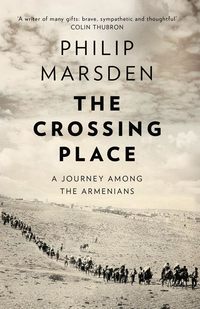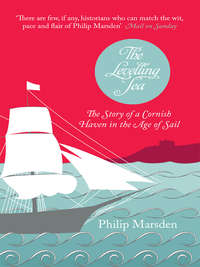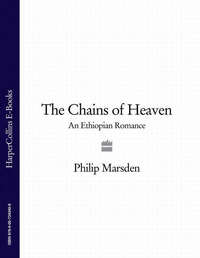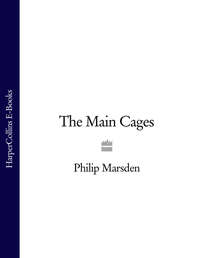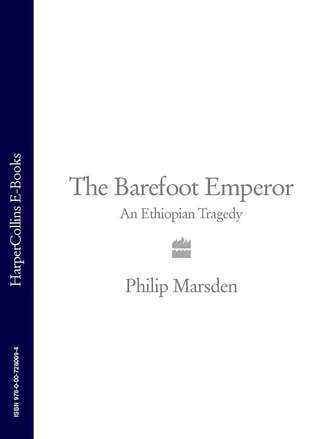
Полная версия
The Barefoot Emperor: An Ethiopian Tragedy
In turn, Waldmeier came to the attention of Tewodros early on by repairing some of his great store of broken muskets.
By December, Waldmeier had even married into his family. Among the community on top of Meqdela was Tewodros’s cousin Wurqnesh, the wife of John Bell. Waldmeier married their eldest daughter, Sarah (Saalmuller later married her sister). For the wedding Tewodros sent Waldmeier an ornamental saddle embroidered with gold thread, a silk shirt of rank, eighty oxen and five hundred sheep. The feast continued for a whole week.
But Waldmeier felt Meqdela was too isolated for their evangelical work. He told his father-in-law, John Bell, that they needed to establish a mission. Tewodros gave them Gefat, a small hill a little to the north of his capital at Debre Tabor. Plowden had lived here for a while. It was a beautiful place. Accounts of the early days at Gefat, with the young families clearing brush to build lodgings and huts, opening a school for children of the poor, shine with a pioneer zeal.
In time Gefat became a great centre of technical skills. The missionaries built a water wheel. Tewodros sent hundreds of people there for instruction – ‘all the clever men of Abyssinia were brought thither by order of the king’. Tewodros himself paid visits more and more frequently. ‘I often sat for hours with the king,’ wrote Waldmeier, ‘engaged in religious conversation and speaking about the welfare of his country and its people.’
Then John Bell was killed and Tewodros’s world grew darker. The high-minded conversations became less frequent and the emperor made it clear what he wanted from the missionaries at Gefat. He wanted them to build guns, bigger and bigger guns.
16
Tewodros first tried to build artillery before he became emperor, during a campaign against Ras Ali. He hollowed out a log, coiled wire around the outside and filled it with stone shot. It wasn’t a great success. His victories enabled him to capture a few cannon. He received four more from Said Pasha, but other gifts of guns tended to be seized by the Turkish governor at Massawa. Lacking a coastline, Tewodros realised that if he was to have proper artillery, he would have to make it.
In 1861 a man named Monsieur Jaquin arrived in Ethiopia, and word spread that this Frenchman was something of an expert in metal casting. Tewodros sent him an order: Go to the community of Gefat, where Theophilus Waldmeier and the Protestant missionaries will assist you in casting a cannon. In turn he told the missionaries that they must provide Jaquin with all the materials he required. They must organise labour for him and support him in every way in the construction of ‘deadly weapons’.
‘We could make no objection to this,’ wrote the ever-forgiving Waldmeier.
Jaquin arrived and the missionaries recruited hundreds of workers. Some were despatched with mules to the iron mines. Others collected boulders of tufa to be broken and graded. Within days the walls of a blast furnace began to rise on the small knoll of Gefat. Ox-hides were sewn together to make bellows. Charcoal was burnt, and Jaquin inspected the work with some anxiety. The day came when he decided that it was complete, and a great crowd gathered to watch.
The furnace was lit. The bellows pumped. Blasts of air shot through the clay tuyère. The fire inside flickered, then whooshed into life. Nervously Jaquin stood watching. The fat leather lungs swelled … emptied … swelled … emptied … The temperature climbed higher. The ore inside took on a yellowish glow. Still the bellows worked. The heat rose still further, the ore glowed brighter – and then, very slowly, the outer walls of the furnace began to crumble.
‘The Frenchman,’ observed Waldmeier, ‘began to lament and weep; he went half-mad, cried wildly and finally asked the king’s permission to leave. After obtaining it he left the land.’
Some time later, Tewodros himself came to Gefat. He summoned the missionaries. He told them they must carry on with the work of Jaquin, and endeavour to forge a large gun.
‘Your Majesty,’ they said with all due tact, ‘we have neither knowledge nor experience in this matter, and are quite ignorant of it, and we are afraid to try what is above our strength.’
‘That does not matter,’ replied Tewodros. ‘If you are my friends, then try. If God allows it to succeed, it will be well; if not, it also will be well.’
They found that no argument could be made against that statement. Before leaving, Tewodros encouraged them by ordering their servants to be imprisoned. Waldmeier and the others came together to discuss the matter. Building guns to terrorise the people was not what Gobat had in mind when he sent them out. But they agreed that the work of the Gefat mission – the school, the informal teaching they dispensed to the hundreds of workers – was of great value. They must obey Tewodros. But how? They prayed for guidance. They debated. They prayed again. They tried to remember all that Jaquin had talked about. They made several attempts at rebuilding the blast furnace with stronger walls. All failed. They did not know what to do – and also all their servants were locked up. The missionaries agreed that they should go to the emperor and explain to him that they were willing to undertake any work for him, anything – building of roads and bridges, teaching – but not casting metal. It was too difficult.
Tewodros told them to make him a cart.
Mayer set to work. He produced a vehicle hauled by four mules, but the wheels were useless without roads. The farmers found it a great joke, because it had to be taken to pieces to go any distance. Waldmeier spent days fashioning a gunstock for Tewodros, and when he saw its beauty the emperor ordered the release of the missionaries’ servants.
But he was no closer to building cannon.
For some years there had been in Ethiopia a Pole named Moritz Hall, a deserter who had fled the tsarist strictures of the army of Nicholas I for the boundless south. By trade he was a caster of bells, and as the Protestants at Gefat struggled even to build the means for casting, Hall performed a small miracle in another part of Tewodros’s kingdom. He made a gun. It was strangely bell-shaped, but propped on its side it appeared heavy and robust and warlike.
‘When the king saw it,’ said Waldmeier, ‘he jumped with happiness and thanked God.’
For some time Tewodros felt the same joy every time he looked at the gun, but then, gradually, he became less satisfied. He sent for Hall and told him this one was too small. He wanted a larger one.
‘I alone am unable to undertake such a work,’ replied Hall, ‘but if the Europeans at Gefat help me I hope to be able to oblige Your Majesty.’
‘Waldmeier and all the Europeans shall be put at your disposal; consult together and work together in mutual love.’
With the emperor’s blessing Hall went to Gefat. When he told the Europeans what they must do, they all became nervous. Many times Tewodros’s messenger came to Gefat, and every time they had to tell him there was no progress. Never mind, the emperor told them. Begin again at the beginning, and do each thing with care.
Then another European, an Austrian named Baptist, arrived at the court of Tewodros. He had heard of the emperor’s longing for munitions, and said he had managed to make high-quality gunpowder from local components. He produced a small pouch of it and, time and again, when he ignited it the powder exploded in a most beautiful manner.
Tewodros was delighted. He gave the man honey and sheep, and butter and cash, and asked him to prepare a larger batch. But it soon became clear that Baptist was not what he appeared. The powder he had been demonstrating was English powder. He had brought it in from abroad, and now it was finished. When Tewodros again asked him to demonstrate, Baptist really did use local components, and it failed. Even when it was thrown in the fire, nothing happened. Baptist fled. Some time later, the missionaries heard that he’d been accused of murder in Mecca, and executed.
‘We made a final despairing attempt,’ wrote Waldmeier. ‘And behold, for the first time, we were successful.’
At Gefat, success was no closer for Hall and the missionaries. Whispers reached the ears of Tewodros: these Europeans are liars, they’re just deceivers like Baptist. The emperor was shamed in the eyes of his people, and in his shame the missionaries realised their own danger. They gathered together and prayed. One last time, they collected ore and prepared the furnace.
At once everything changed. The local people stopped laughing at them. They marvelled at the gun and congratulated them. ‘The king,’ wrote Waldmeier, ‘was pleased beyond all measure with our little piece of metal, kissed it and cried, “Now I am convinced that it is possible to make everything in Habesh. Now the art has been discovered. God has at last revealed Himself!”’
He arranged a great feast for the missionaries and asked, ‘What, save my crown and my kingdom, can I give you?’
‘Your Majesty,’ replied the missionaries piously, ‘we wish for nothing but to remain in constant possession of your love and friendship.’
Tewodros gave them a thousand thalers each, and for a while all sides were happy.
Then the emperor asked for a larger mortar.
Once again the missionaries were afraid. They retired to Gefat and prayed and prayed, and were successful. In response, Tewodros wrote one of the longest and most effusive of all his surviving letters:
My friends and my children! God, who can do everything, and does it, has not allowed us to be shamed in our work. Many people who hate us in this country as well as abroad, have derided and mocked us, but now they have been disgraced, since God is moved in all things by the prayers of those who believe in Him and he helps them in time of need.
You have opened the eyes of us Abyssinians, whom others have abused as blind donkeys.
(Tewodros himself, for one – ‘My country is like a paradise,’ he once told Waldmeier, ‘only I am sorry to say it is inhabited by donkeys.’)
Hard work and perseverance had rewarded the Protestant missionaries:
Since God said to Adam, ‘In the sweat of thy face shalt thou eat bread,’ it would be a sin to lie down like a sluggard and not care about a country like this, which still lies in such disarray.
The letter was clearly written in one of the emperor’s more excitable moods – when his imagination raced across the centuries:
Napoleon Bonaparte, the emperor of the French, who defeated other kings with many guns and mortars, at last fell from his high position and died. Although he was a strong ruler, Nikolai, the emperor of the Russians, was defeated by the English, the French and the Turks, and died soon after, without being able to carry out the plans of his heart. Sennacherib of Assyria was proud of his power and relied on himself. In the pride of his heart he abandoned the Lord and died. The pharaoh of Egypt was proud of his power, hardened his heart against God, and perished in the Red Sea. But what more shall I say to thee? You yourselves are learned and well versed in the Bible. ‘Do not cut meat for a lion and do not teach a learned man.’
At the same time, Tewodros displayed a touchiness about his own parentage and ancestry – a theme which preyed on him more and more:
Finally, I have to note that people have slandered me, saying that I am not the rightful heir to the throne, but only the son of poor parents. It is possible to prove my ancestry and my right to the throne from Abraham to David and Solomon, from there to Fasil and Fasil to myself.
One day a few months later, the emperor came to Gefat and asked for a demonstration of the guns. The party assembled in front of Saalmuller’s house. A carpet was spread out for Tewodros and he tucked his legs under him and took his place. The others gathered to one side and behind him. The most recently-cast mortar was brought out. It was the largest the missionaries had built so far. It was charged and primed. Brother Bender, House Father of the mission, leaned down to fire it. For a moment there was silence. Then the mortar lurched back out of its carriage, and Bender had to leap aside to avoid it. Distant slopes repeated the shot in ever-decreasing reports. Tewodros was silent.
Several more shots were fired. All the while, Tewodros said nothing. The missionaries were apprehensive. His lips were pressed tight together, his brow pressed down over his eyes. He appeared to be in some sort of trance.
But as soon as the last shot had been fired, he put an arm around the shoulder of one of the missionaries’ children and began a lively conversation about military strategy, asking about the powers of Europe and their use of cannon. Once again he admired the new gun, telling them all what a fine job they had done and what a beautiful gun it was. But it was too small. Now, according to the will of God, they must build him a bigger one.
IV
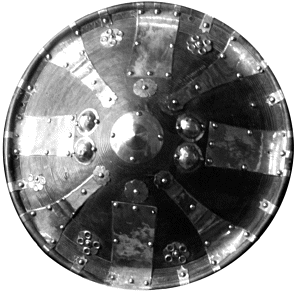
Ethiopian shield, silver on buffalo skin, nineteenth century. (Reproduced courtesy of Gail Warden)
17
On 7 October 1862, two and a half years after Plowden’s death, Tewodros ordered his ministers to put on their silken lemds, their lion’s-mane cloaks, their finest shammas, and to gather in his salon tent. He himself settled on a silk-covered divan. He placed a double-barrelled gun beside him, and two loaded pistols. The boom of twelve cannon bounced back and forth from the surrounding slopes.
The tent flaps lifted, and the new British consul ducked through them. He was unwell. He asked to sit down. Tewodros sensed at once that here was a different sort of man to Bell and Plowden. Charles Duncan Cameron was a little older than them. For many years he had obeyed his orders as a soldier, then served as consul in the Black Sea port of Poti. For eighteen months, he had delayed his departure from London. Tewodros’s late British friends had loved Ethiopia and none other. For Cameron it was another posting, and an uncomfortable one at that.
Tewodros began by explaining exactly what had happened to his predecessors. He listed the details of Plowden’s luckless death, and how it had been avenged. He explained that after Bell was killed he had taken five hundred prisoners and had them decapitated in Debarek market. The heads made such a large pile, the chronicler said, that they could only be counted in rows. ‘This was done,’ explained Tewodros modestly, ‘in order to win the friendship of Her Majesty.’
A couple of days later Cameron had another interview. Tewodros’s principal concern was ‘the Turks’ (meaning both Ottomans and Egyptians). In recent years, his good relations with the Egyptians had broken down. Annexing Tigray had also brought him up against the Ottomans of the Red Sea coast. He wanted to attack, to push the Egyptians back from the lowlands of the west, to march on Massawa. Before doing so, he was keen to have the support of the Christian powers of Europe.
Ethiopia, stressed Tewodros, was being encroached upon on all sides by Muslims, and he would do all he could to see off their incursions. ‘If not,’ he said, ‘I will die preventing it!’
All this talk of war and defiance worried poor Cameron: it was ‘not the sort of temper I was sent to encourage’. He made the position clear to Tewodros: if you maintain peace, we can invite your envoys to London and ensure their safe passage. But if you fight, it will be impossible.
‘Skirmishes?’
‘No.’
Cameron returned to his tent. He had done his duty. Diplomacy must follow its proper course.
Over the coming days, he noticed that the food delivered to his tent became worse, and less frequent. When he tried to see Tewodros, it was not convenient. Those charged with looking after him became curt and careless. They began to ask how long he’d be staying. When the requests were made ‘hourly’, the consul grew impatient: ‘I will stay six months if that’s what it takes to finish the work I was sent by my government to do.’
Tewodros was furious. ‘Leave for the sea at once!’ he ordered the consul.
But Cameron knew that Her Majesty’s diplomats were not dismissed like that. He stayed, and his patience was rewarded. When he did leave camp, a month or so later, he carried a letter of friendship to Queen Victoria.
Tewodros did not only write to Great Britain. He told Cameron he wanted to inform ‘all Christendom’ before making any move against the Egyptians and Turks. He wrote to France, and also possibly to Holland, Germany, Austria and Russia. Only two of these letters survive – though the common ground between these two suggests that they would all have said broadly the same thing. To Queen Victoria: ‘The Turks [Egyptians] refused to leave my father’s land when I told them to. Therefore, by the power of God, I shall fight [them] now.’
To Napoleon III: ‘The Turks [Egyptians], however, resist the will of God, and since they refuse to surrender the land of my fathers, I am going out to fight with them.’
The basis of his appeal for friendship varied a little more. To Napoleon III, he wrote: ‘The splendour of your reputation as the emperor of the French and the prince of the Christians has reached us. I rejoiced and desired that, by the Grace of God, bonds of friendship would unite us, that you would look upon me as one of your relatives, and that you would love me.’
To Queen Victoria, he recalled that ‘Mr Plowden and Liqemekwas John used to tell me that there is a Christian king, a great man, who loves Christians, with whom they would acquaint me.’ (The confusion of Victoria’s gender lay more with the scribe than with Tewodros.) He also asked to send embassies. Plowden had always made it clear that, when peace permitted, the two countries could exchange envoys. Peace was still pending. ‘Since the Turks deny me passage by sea,’ he told Queen Victoria, ‘I have been unable to send my envoy with Consul Cameron.’
To Napoleon, he said: ‘I wish to send you ambassadors. Please, Your Majesty, let me know if you will indeed receive them.’
Tewodros had made his appeal. He now settled back to wait. The threats from the Egyptians increased, but, placing all his hopes in European support, he kept his forces in camp.
18
Ten months later, Tewodros was sitting in a small recess in one of Gondar’s ancient palaces. Around him was the scatter of vellum and parchment, the nap of leather-bound books. Behind him rose a tall, glassless window. Below was the palace compound and the walls, and beyond that the town and the tents of his army and in the distance, streaked by early sun, stretched the plains, green and fertile after the rainy season. It was early on the morning of 28 September 1863, and the wild celebrations of Mesqel, the Feast of the Finding of the True Cross, were over. The great pyres had all burnt down. The city dozed.
Tewodros did not doze. He had summoned the Europeans to a meeting. Out of the half-darkness of the palace interior came Consul Cameron in his blue diplomatic uniform. He had returned, as had Monsieur Bardel, the French envoy. A number of the missionaries were with them – Theophilus Waldmeier and Reverend Henry Stern, who had been trying to convert the Falashas, the Ethiopian Jews. They all arranged themselves at the emperor’s feet, on a semi-circle of rugs.
While waiting for a reply to his letters to European capitals, Tewodros had been attacked by the Egyptians. Musa Pasha had looted Metemma, burned Dunkur, marched on Wehni. Tewodros’s hold on the lowlands was destroyed, his native Qwara overrun. He had done nothing. During his visit, Cameron had convinced the emperor that European support was too great a prize to risk with an impulsive attack. Tewodros waited for a reply to the letters.
Yet by June not one response had come back. When Cameron returned to Ethiopia just before the rains, he was empty-handed.
‘Your Majesty,’ he promised, ‘I will give my head if after two months the answer to your letter is not here.’
Tewodros was already angry with Cameron. He had not taken Tewodros’s letter himself, but sent it to London by a messenger. He then went off to travel through the eastern Sudan, the very lands that the Egyptians had overrun.
A couple of months later, Tewodros received better news. A response had arrived from the French, and he had now called the Europeans to hear it read out. He turned to M. Bardel and asked him about his mission – Bardel, who at least had had the courtesy to go to Paris.
‘Your Majesty, I met with a most uncourteous reception at the court of France.’
‘Did they provide you with a house, food and all you required?’
‘No, Jan Hoi. I got neither a house to dwell in, nor food, nor money to supply my daily wants.’
‘What did the emperor tell you when you presented my letter?’
‘He dismissed me with the sarcastic sentence, “I will have no direct intercourse with a sovereign who cuts off the hands and feet of his subjects.”’
Several things were at once clear to the others listening. Bardel and Tewodros had rehearsed this exchange, Bardel was making it up – he had never had an audience with Napoleon III – and Tewodros was struggling to control an unholy rage.
He told Consul Cameron to read out the letter from the French. It was not even from Napoleon, but from the Minister of Foreign Affairs, M. Drouyn de Lhuys, dated 23 March 1863. Just as the British government had through Plowden, the French urged Tewodros’s protection of Catholic missionaries: ‘all those governments worthy of calling themselves civilised have adopted the principle of freedom of belief’.
Like the British too, the French found it necessary to lecture Tewodros on his war plans. ‘Before going to war against powerful neighbours, it is as well to take note of their forces, and to guard against losing any advantage already acquired in rushing into such a hazardous undertaking.’
Tewodros had placed great faith in the Christian powers of Europe. This is what came back. The more he saw of Europeans, the more disappointed he was. In their world there seemed no clarity of alliance – Christian and Muslim fought on the same side. Privately the French envoy said one thing to him, the British another; when he asked for their support in defending himself, they said the same thing: don’t. He had taken a personal dislike to the two envoys, Bardel and Cameron. ‘The Frenchman is a madman, the Englishman an ass,’ he was reported as saying. The individuals now sitting at his feet were not, in his eyes, of the calibre of loyal John Bell or Walter Plowden.
He snatched the paper from Cameron’s hand. ‘Is this an answer to my letter? Napoleon may think himself great, but I am greater still. His genealogy is only of yesterday, mine I trace back to David and Solomon!’
Each of those sitting before the emperor, watching his anger, realised that something had changed. They had come to Ethiopia for their own reasons – duty, vocation, adventure. Many now decided that the time had come to leave. Those who did not looked back to that morning in the old palace at Gondar and remembered the sight of the raging Tewodros, and realised it had been their last chance.
19
Just over ten years had passed since Tewodros rebelled against Ras Ali and began his dazzling march to the throne. He had defeated Ras Ali and his mother Menen and Wube and Goshu and Biru, all the giants of old. The Yejju dynasty was no more, the kingdoms of Wag and Lasta were under his rule, Shoa and Tigray too. With the support of Abune Selama he had rid the Church of hundreds of years of division. He had purged and conquered, and put in place reforms to elevate the ancient kingdom back to its rightful place in God’s order.
In 1859, Tewodros had admitted to Plowden that it was all taking a little longer than he’d hoped. ‘Providence,’ he explained, ‘wills that some delay should interpose between my coronation and my perfect success.’
Four years later, he saw things more darkly. ‘It is evident I have deceived myself. This is a stiff-necked people, and it is necessary to chastise them before they enjoy the blessings which Providence has intended for them.’


